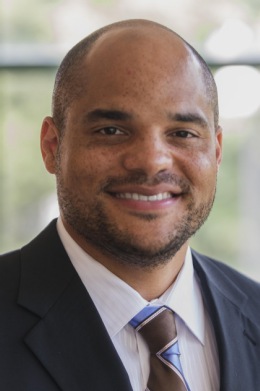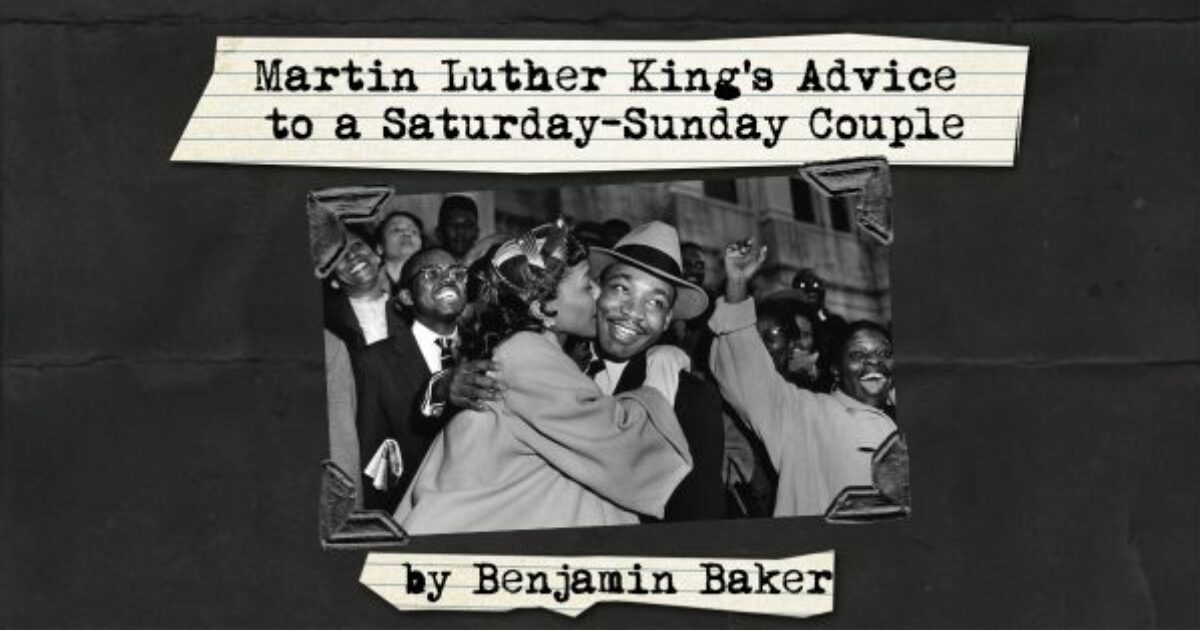Martin Luther King’s Advice to a Saturday-Sunday Couple
by Benjamin Baker | 21 January 2019 |
Question: Please help me and my wife to settle our religious differences. My understanding is that a man and his wife are to be as one in everything, I am a Baptist and she is a Seven-Day [sic] Adventist. She goes to church on Saturday and I go to church on Sunday. I don’t think that is being as one and I don’t think God is pleased.
Answer: There can be no gainsaying of the fact that it is always a wonderful thing when husband and wife attend the same church. However, when such an arrangement does not exist, the family need not live in continual disharmony. The problem may be solved by concentrating on the unity of your religious views rather than accentuating your differences. There are certain basic points, such as the God concept, the lordship of Christ and the brotherhood of man that all Christians should be united on. Consequently, there can be unity where there is not uniformity. If you and your wife will concentrate on these points of unity and seek to minimize the ritualistic and doctrinal differences, you will come to see that you are not as far apart in your religious views as it appears to you on the surface.[1]
The preceding exchange appeared in Ebony magazine of June 1958, in Martin Luther King Jr.’s monthly column “Advice for Living.” At the time, King was a 29-year old married man, father of two, and pastor of the Dexter Avenue Baptist Church in Montgomery, Alabama. He was already internationally famous, the previous year appearing on the cover of Time, and meeting with Ghanaian prime minister Kwame Nkrumah and US vice president Richard Nixon. In fact, the very month that King’s above advice appeared, the young minister met with President Dwight Eisenhower in the White House. Yet amid a life already crammed with nerve-wracking marches, fraught strategizing, heady conferences, and death threats, King took time out to address the domestic and mundane in the pages of Ebony.[2]
As with any advice column, there is more going on than appears on the surface. The concerned husband is seeking advice on a marriage that seems to have reached an impasse. As was the case yesteryear, but not as much today, many blacks would seek counsel from Christian ministers on things marital, parental, political, and financial. One can’t help but anticipate that when the inquiring husband states that he is Baptist, that King, a fellow black Baptist husband, would side with the man against his Seventh-day Adventist wife. But King does not, instead offering a very measured and wise approach to preserving the husband’s marriage and the family.
King and Adventists
The husband characterized his marriage as adversarial due to his being a Baptist and his wife an Adventist. Martin Luther King’s relationship to Seventh-day Adventism was certainly not adversarial, although we know that he disagreed with Adventism’s major distinctive tenets. King would have a close relationship with several Adventists throughout his life; indeed, Adventists would be on the front line with King throughout the Civil Rights Movement.
The Montgomery Bus Boycott, the event which propelled King to civil rights leadership, was inspired by Rosa Parks, who refused to move from her bus seat for a white man in 1955. An Adventist woman and close friend of Parks named Mineola Dozier Smith was on the bus with her on the historic day that she refused to move from her seat. When Parks was arrested, Smith and other blacks vacated the bus in frustrated solidarity with Parks.[3]
Vincent Harding, King’s confidante and occasional speechwriter, was raised a Seventh-day Adventist.[4] Martin King spoke at Oakwood College (the only venue that opened its doors to him in the city of Huntsville) on March 19, 1962. The next year Yolanda Clarke, an Adventist musician from New York City, performed at the March on Washington and stood directly to the left of King as he delivered the “I Have A Dream” speech.[5] Richard Bland, a Seventh-day Adventist minister and founder of United Prison Ministries, walked a couple of feet behind King on the historic march in 1965 from Selma to Montgomery, Alabama.[6] King was aware, as well, of the role that individual Adventists played in the Civil Rights Movement prior to his own involvement, including T.R.M. Howard, Arna Bontemps, Richard Wright, Louise Little, Irene Morgan, Terrance Roberts of the Little Rock Nine, and others.
Martin King spoke at Adventist churches and was acquainted with several black Adventist ministers, most notably the indefatigable E.E. Cleveland. Cleveland held an evangelistic meeting in Montgomery in the summer of 1954, right at the time King had moved to the city and begun his pastorate at Dexter Avenue Baptist Church. Cleveland reminisces that one evening King and his best friend Ralph Abernathy stopped by his tent and the three “engaged in a friendly, though lively, theological debate.” Cleveland baptized close to 500 people from the meetings that summer, giving Adventism a major presence in King’s small city. We have interviewed numerous Adventists from Montgomery, some of whom were baptized by Cleveland in 1954, who participated in the Montgomery Bus Boycott.[7]
Within a couple of years, King would become world famous, yet Cleveland writes:
King never forgot me… He and a Baptist pastor from Baltimore were riding in Washington whey they saw my name on the marquee at the famed Capital Arena. I was holding an evangelistic campaign there.
“Park the car,” Dr. King told the pastor. “Let’s go in here and hear a good sermon.”
They came in and stayed the entire service.
How did I get the story? The Baptist preacher with whom King was riding had a niece, Carolyn Hinson, whom I had baptized years earlier. He flew into Atlanta to Dr. King’s funeral and called Carolyn to come to the airport to pick him up. While he was eating a breakfast of grits, eggs, and vegetarian stripples, he suddenly laughed.
“Where is evangelist Cleveland?” he asked.
“He’s headquartered in Washington,” Carolyn said.
He then told her the story [of how Cleveland had helped King at a civil rights event].[8]
It is clear from King’s involvement with Adventists in the Civil Rights Movement alone, that many black Adventists largely ignored white church leaders’ admonitions to not participate in the Civil Rights Movement. Why? Simply this: Adventism has never changed a person’s blackness, and African-Americans have never had the luxury of staying out of politics or social movements. Historically, politics and policies have directly adversely affected and afflicted black people. This being the case, black Adventists have deemed it unchristian, inhumane, and unconscionable to pass by and do nothing, like the priest and Levite, while their brothers and sisters lie naked, beaten, and left for dead by the political system. The myth that Adventists did not participate in the Civil Rights Movement needs to be dispelled—black Adventists certainly did.[9]
King and Adventist Beliefs
King’s relationships with individuals who were Seventh-day Adventists, and his exposure to the church growing up in Atlanta and pastoring in Montgomery, gave him a working knowledge of Adventist beliefs. This is evidenced in his reply to the husband in his column:
“The problem may be solved by concentrating on the unity of your religious views rather than accentuating your differences. There are certain basic points, such as the God concept, the lordship of Christ and the brotherhood of man that all Christians should be united on.”
In the year after the publication of Questions on Doctrine, when most of the evangelical world still thought of Seventh-day Adventism as a non-Christian cult, King considered Adventists to be as Christian as himself and his fellow Baptists, serving the same God and following the same Jesus.
From my research, it seems that the misunderstandings on the part of evangelicals and the deep insecurities of certain Adventist ministers that eventuated the Adventist-Evangelical dialogues were simply non-issues in the African-American Christian community. I have found no consistent and sustained attacks on Seventh-day Adventism in black publications, or among black Christians, calling Adventism a cult or unchristian.
The reasons for this may be too complex to share here, but essentially, I think this is because up to the 1950s (and even beyond) black Adventist churches were almost always located where black people were, in urban ghettos or rural ghettos. American blacks saw, knew, and lived among black Adventists, and so it would have been very hard for them to be ignorant of them or misunderstand them. Further, because blacks had a shared plight in America, there was not the almost religious xenophobia among black Adventists toward non-Adventist blacks that many white Adventists exhibited toward non-Adventist whites. Non-Adventist black Christians may have been in the proverbial Babylon, but the white man hated the black Adventist and the black Babylonian equally. Hating and separating from each other based on religion didn’t make sense; blacks had bigger existential enemies.
Martin King gets at this in his column. In an ecumenicism that many Adventists may frown at, King counsels the Baptist husband to find common spiritual ground with his Adventist wife. Although it may appear as if King is downplaying the importance of Adventist distinctives, I don’t think he is, although we can be sure that the seventh-day Sabbath certainly was not as important to King as it is to an Adventist. Rather, King, who was writing in a time in which marital vows were still meaningful, was giving counsel for a contented and lasting union.
King’s outlook as a civil rights leader also comes through here: his greatest pitch for equal rights was to highlight the common humanity of blacks and whites, and not focus on trivial differences. Marriage, like relations between the races, should never be adversarial, but cooperative.
King Today
If King’s message does not challenge people where they are and whenever they hear it, then it might not be King’s true message. What is King’s counsel to two married people who want to make it work but who have honest differences? Simple but profound: Concentrate on the “certain basic points” that you have in common, and not the differences that will surely doom your marriage. Strive for true unity, which is to be at one on the points that really matter; and not uniformity, a superficial effort at precisely aligning with each other in the myriad points that are not central to your union. When you “concentrate on these points of unity…you will come to see that you are not as far apart…as it appears to you on the surface.”
- “Advice for Living,” The Martin Luther King, Jr. Research and Education Institute, Stanford University (https://kinginstitute.stanford.edu/king-papers/documents/advice-living-11). ↑
- “Major King Events Chronology,” The Martin Luther King, Jr. Research and Education Institute, Stanford University (https://kinginstitute.stanford.edu/king-resources/major-king-events-chronology-1929-1968). ↑
- “Mineola Dozier Smith, 94, recalls witnessing arrest of Rosa Parks on Montgomery bus in 1955, which helped spark movement to end segregation in South,” New York Daily News, November 29, 201. ↑
- “Vincent Gordon Harding,” The Martin Luther King, Jr., Encyclopedia (https://kinginstitute.stanford.edu/encyclopedia/harding-vincent-gordon). ↑
- https://www.adventistreview.org/church-news/story2267-whos-that-adventist-woman-beside-martin-luther-king-jr ↑
- https://www.youtube.com/watch?v=9SAIe5cH-aA ↑
- https://news.adventist.org/en/all-news/news/go/2005-10-31/ann-perspective-rosa-parks-civil-rights-pioneer-touched-adventist-lives-in-her-city/ ↑
- E.E. Cleveland, Let the Church Roll On (Pacific Press, 1997), 44. ↑
- For a good overview of some of these figures, see Samuel G. London, Jr., Seventh-day Adventists and the Civil Rights Movement (University Press of Mississippi, 2009) ↑
 Benjamin Baker, PhD, is the creator of blacksdahistory.org.
Benjamin Baker, PhD, is the creator of blacksdahistory.org.




